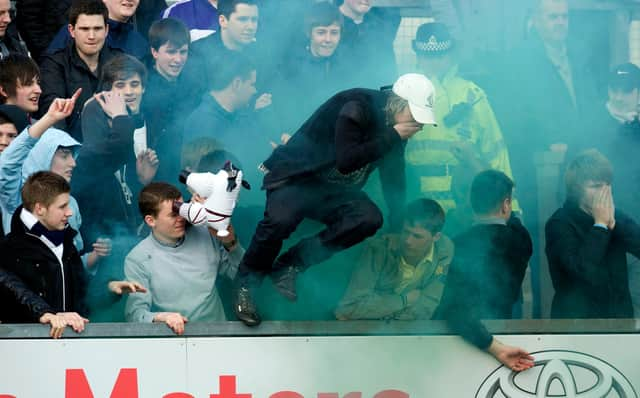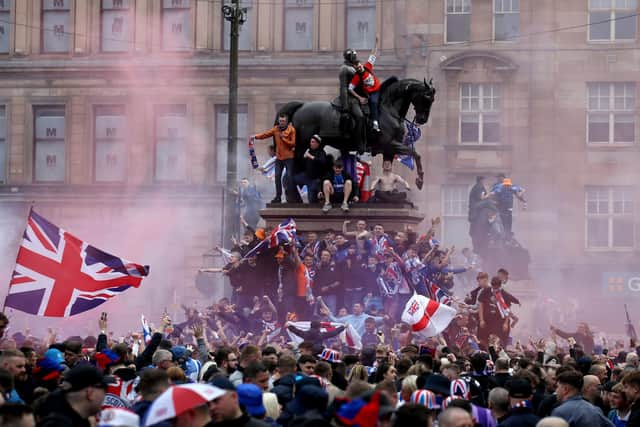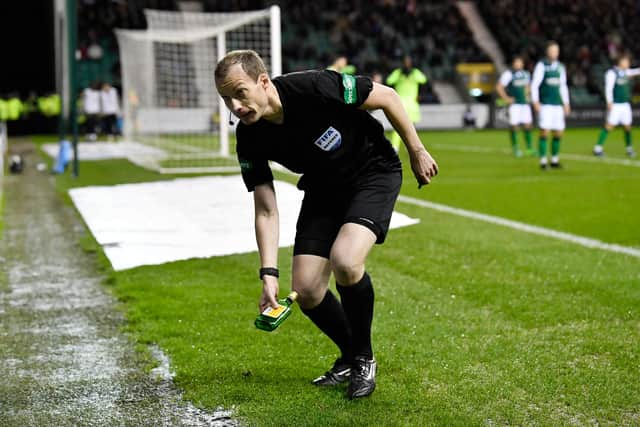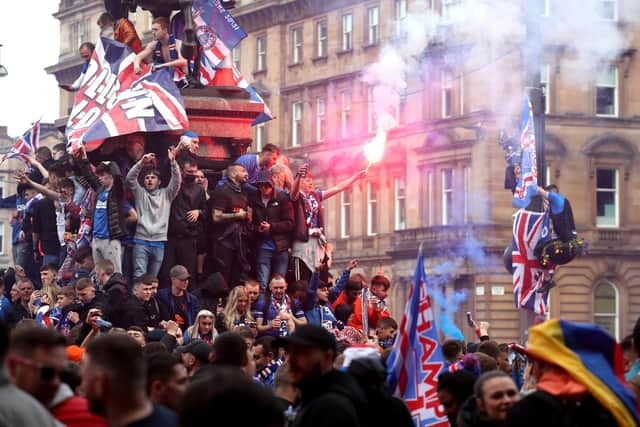Rangers: What impact would strict liability have had on fan disorder and bigotry in George Square?


The invoking of two words that variously prompt alarm, outrage and a sense of moral indignation among the footballing populace: strict liability. We have been here before, of course. Many times before. Any unsavoury incidents that involve coin-throwing, bottle-chucking or hooliganism within Scottish football grounds tend to spark the debate about clubs being held accountable for the activities of their supporters; what, in a nutshell, is the basis of strict liability as commonly understood.
Yet, while many of us have long argued that introducing a form of strict liability to the Scottish game is overdue, it would not be the panacea for the ills witnessed at the weekend as proponents might like to think. As it stands, UEFA operates strict liability, and a version of it exists in England. For background, in their disciplinary regulations, the governing body explain the concept as thus: “Host clubs and national associations are responsible for order and security both inside and around the stadium before, during and after matches. All associations and clubs shall comply with the obligations as defined in the UEFA Safety and Security Regulations. They are liable for incidents of any kind and may be subject to disciplinary measures and directives unless they can prove that they have not been negligent in any way in the organisation of a match.”
Advertisement
Hide AdAdvertisement
Hide AdSo far, so understandable. UEFA go on to set out, with absolute clarity, the discriminatory and offensive behaviour beyond “order and security” that will be actionable through their disciplinary processes. So any behaviour that “insults the human dignity of a person or group of persons on whatever grounds, including skin colour, race, religion, ethnic origin, gender or sexual orientation”, as would be expected, are listed. The use of pyrotechnics is also prohibited. Notably, so too are “the use of gestures, words, objects or any other means to transmit a provocative message that is not fit for a sports event, particularly provocative messages that are of a political, ideological, religious or offensive nature.”


Celtic and Rangers have been sanctioned by UEFA countless times over the years on such bases. Celtic, for a variety of offences that have included pyrotechnics, displaying Palestinian flags and IRA gestures, and Rangers for also a number of different infractions, again including pyrotechnic, use but ,most seriously, for “racism - which includes sectarian singing” owing to the anti-Catholic/anti-Irish elements of their songbook. In the case of the Ibrox club, these charges led to a section of their stadium being closed on two seperate occasions inside the past two years.
There is no reason why both should not be called out for these transgressions in the domestic sphere. As, it should be recognised, would a host of other Scottish clubs owing to the wide-ranging nature of the disciplinary measures. Hibs were involved in two bottle-throwing incidents during the 2019-20 season – over which UEFA would take an exceedingly dim view – while no end of supporters from clubs right throughout the land pursue an infantile obsession with throwing flares and fireworks. There would be fines, and a whole host of potentially more grave sanctions, if strictly liability was adopted in Scottish football. Moreover, what are considered “gestures” and “provocative messages” “not fit for a sports event” are far from the preserve of the Glasgow clubs.
As a means of improving fan behaviour, which before the pandemic was moving in a disturbing direction, strict liability would be a start. A range of tariffs, which begin with fines for first offences but can result in stadium closures and point deductions for repeat offenders, would help create a culture in which anti-social acts are understood to have consequences. And stadium environments in which bigoted songs coud not be belted with impunity.
Yet, all of this has practically no relevance in addressing how to ensure there is never any repeat of the gruesome scenes that unfolded in and around Glasgow’s George Square at the weekend. That is the case because, in taking place outwith the stadium footprint and being the responsibility of no individual that had even attended a football match, Rangers could not be held responsible under the strict liability measures as we understand them, and as are operated by UEFA. Which is surely only right.


No club surely can be held accountable for how – what are then essentially – members of the public behave outside of their environs. A nightclub may be closed down if dealers are repeatedly found to be selling drugs within the premises. However, it won’t face closure if the same dealers carry out their transactions on the street corner opposite. Liabilities, in this footballing context, relate strictly to those that can be reasonably considered to come within their jurisdiction.
The Scottish government, in a horribly botched fashion, sought to close that gap and extend its reach with the now-repealed Offensive Behaviour at Football Act. A piece of legislation that essentially criminalised behaviour of football supporters travelling to and from games that would not necessarily fall foul of the law if the same people were simply out and about.
The strict liability calls will always fall on deaf ears. Only three clubs out of the 42 in senior football were understood to be in favour when a survey was conducted in March 2019. Celtic and Rangers have most to lose, with the biggest fanbases. However, other clubs are not in favour because, to limit their exposure to such sanctions, the big two would simply decline to take away tickets – punching mighty holes in the budgets of many top flight rivals. A depressing reality...but the reality nonetheless. Strict liability will never be adopted in the Scottish game, even if it should be. But equally depressing is that the societal problems laid bare by the mayhem in George Square the other day wouldn’t be solved even if it were to be.


A message from the Editor:
Thank you for reading this article. We're more reliant on your support than ever as the shift in consumer habits brought about by coronavirus impacts our advertisers. If you haven't already, please consider supporting our trusted, fact-checked journalism by taking out a digital subscription.
Comments
Want to join the conversation? Please or to comment on this article.
